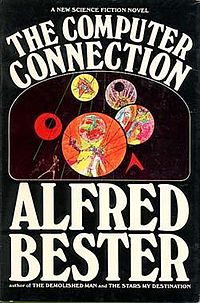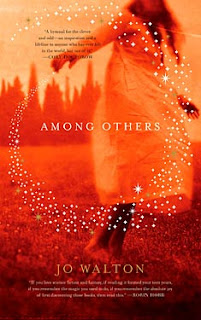The Famished Road by
Ben Okri
Published :
Jonathan Cape, 1991
Series : Book 1
in the Abiku Trilogy
Awards : Man
Booker Prize
The Book :
"Our country is an abiku country. Like the spirit-child, it keeps
coming and going. One day it will decide to remain." ~p.478 The Famished
Road
“Azaro is an abiku, a spirit child that does not want to be born. Abiku make pacts with their spirit
companions to not leave the perfect happiness of the spirit world for the
difficulty and sorrow of a mortal life.
When an abiku is forced to be born, he typically returns to the spirit
world as soon as possible. Azaro,
however, chose to stay, in order to bring happiness to the woman that would be
his mother.
Though his spirit companions call to him, though the road he sees ahead of
him is a thankless, painful struggle, he continues to refuse to abandon his
mortal life. Azaro lives his life
of hardship with his loving parents in a poor Nigerian community. Caught between life and death, Azaro
has a connection to the spirit world, and the spirits plague his life as surely
as the more mundane problems of hunger, violence, and political corruption.” ~Allie
I read this novel
as a part of the Outside the Norm reading group at WWEnd.com. As a result, a lot of this review is informed
by this discussion (beware of spoilers).
I’ve never read anything by Okri before, and this was honestly nothing
like what I expected. As a random side note, apparently the Radiohead song“Street Spirit (Fade Out)” was inspired by TheFamished Road.
My
Thoughts:
I haven’t had all that much experience with magical realism, so
I wasn’t entirely sure what to expect from Okri’s novel. The supernatural elements, which could
be better termed the spiritual elements, were seamlessly intertwined with reality. The spiritual content seemed to follow
an animist tradition, and it mostly involved visions and spiritual journeys. For example, Azaro often had visions of
various spirits, and they sometimes even physically interacted with him. Also, whenever anyone became sick,
their loved ones went to great lengths to lure the soul back from the land of
spirits into its physical body.
Both Azaro’s visions and the spirit journeys of the sick and dying were
treated as if they were a normal and natural part of life. Sometimes, the interpretations of these
spiritual experiences were relatively clear, but at other times I felt like
some deeper meaning was eluding me.
While the spiritual segments were often very poetically written, I
couldn’t always see the relevance to the story. I feel like this might be a novel that would benefit from
more extensive study.
I was equal parts impressed and frustrated by the protagonist,
the young child Azaro. He seemed
very realistic as a child, and early in the novel he simply observed most of
his world with little understanding or interpretation. He had very little power
to influence or change much in his life. Like many children, he also rarely
reflected on his own actions, and would often simply answer the questions of
adults with, “I don’t know.” In
terms of the narrative, though, having such an incommunicative, powerless
protagonist began to grate after a while.
I had hoped that he would grow throughout the book and become a more
active participant in his society.
While he does age up from infancy to around 10-12 years of age, he never
really loses his childlike passivity.
Most of what Azaro provided was a highly detailed view into a
poverty-stricken community in post-colonial Nigeria. The physical elements of
his world, such as the nearby forest, Azaro’s family’s small, rat-infested
apartment, and the local bar were brought to painful life through Okri’s
descriptive prose. Even more,
though, the myriad people of the community were shown clearly, with all their
dreams, hopes, and flaws. Azaro’s
father dreams big but plans poorly, throwing his money into parties and
alcohol. His mother works
desperately hard, but can’t help the creeping despair that her life will never
be what she once imagined. The
local bar owner, Madame Koto, aspired to material success above all things,
though she was not as single-minded as her legend might make one believe. On a larger scale, Azaro saw how the
people of his community behaved en masse, how they were manipulated by corrupt
politics, how they were divided by petty feuds, and how they felt that their
little corner of the world didn’t really matter at all to those outside. I found it to be a stunningly vivid
portrayal of poverty and the way people coped with their lives.
While the writing was beautiful, and the setting and characters
were complex and fascinating, the actual plot was frustratingly
non-traditional. The story never
appeared to be leading anywhere, or building up to any kind of major
event. It simply continued, as
Azaro’s life and his family and friends’ lives did. The narrative was very cyclical, and even repetitive, portraying
people facing an endless series of small successes and failures that left them
in essentially the same place. While
I realize this was the point, the absence of direction in the plot left the
story feeling like something of a slog. As a representation of the ideas
embedded in the novel, however, the structure of the story makes a lot of sense.
My Rating : 4/5
The Famished Road,
is an impressive work of literature.
The novel gave a very thorough look at Azaro’s poor Nigerian community,
and the animist-style spiritual elements were integrated seamlessly into his
reality. It was interesting to see
a story written from a child’s perspective, but the limitations that placed on
Azaro’s ability to fully engage with his world in an active way were
frustrating. The lack of a
traditional plot sometimes made reading feel like a trudge. One of the central ideas was the
never-ending struggle that defined life, and this was shown by the cyclical,
repetitive stories of daily successes and failures that constituted the novel. While I can see why this work of
magical realism has many fans, I don't think it will become one of my
favorites.





